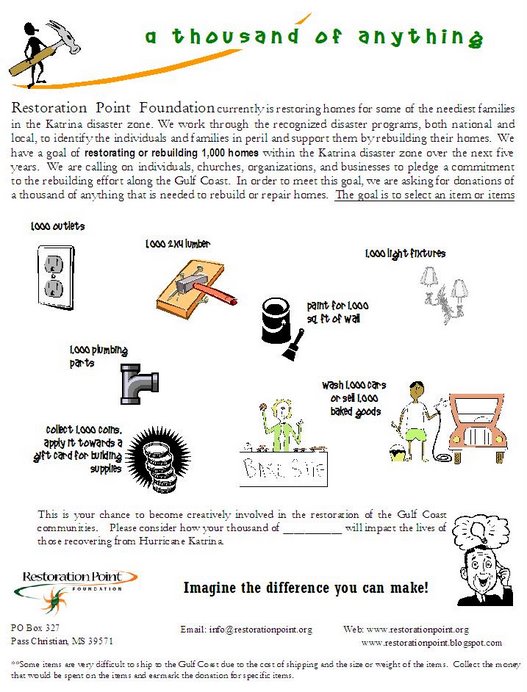Restoration Point is closely monitoring the aftermath of Hurricane Ike. As reports continue to come out of the region, the need appears greater and greater. RPF has identified a region that appears to be the hardest hit outside of the "media zone". We are doing some background research to understand the composition of these communities and will be monitoring the accessibility to these communities. As search and rescue efforts continue, we remain vigilant in prayer for those suffering and know that the rest of the country is ready to rally behind the response effort.
We will be posting information on this blog and on volunteermatch.org for coordinating our efforts. In the meantime, look at the following list of information on how to prepare to respond:
1) First of all, prayer is a source of strength for those impacted by, responding to, and preparing for response to Hurricane Ike. Many areas were impacted by Rita, Gustav, and now Ike.
2) Next, you can organize a team to respond. This should be a team with chainsaws, muck-out buckets, first aid supplies, non-perishable food items, toiletries, and your own food and water. We will not know what the conditions will be upon entering a disaster area and if you are prepared to provide your own needs for at least the first few days you are responding, the less burden you place on the local services for the citizens of the community. Type of people to have on your team include emotional counselors, carpenters, heavy equipment operators, people ready and willing to do muck-outs, fix roofs, remove debris, and provide comfort to those affected by this storm. Make sure you prepare adequately with proper clothing, toiletries, shoes, hats, and water! The communities affected are considered coastal and bayou areas. This means bugs, mold, and hazardous creatures (spiders, snakes, alligators/crocodiles). Safety is a concern!
3) Organize donation center in your community. Some VERY HELPFUL TIPS when coordinating donations - THE LESS "JUNK" YOU ACCEPT, THE MORE HELPFUL YOUR DONATION is to those affected by the storm. Important items to collect will include the following canned and dry foods, paper plates, plastic utensils, clean socks, diapers, toiletries and personal care items (shampoos, razors for shaving, deodorant, soap, etc), sanitizing wipes, bug spray, sunscreen, buckets, cleaning items, brooms, and certain clothes items. When it comes to clothes, please keep this in mind - if you would not wear it, do not send it. There will be a need for clothing, but please be respectful to those to whom you are sending it. Shoes, pants, shorts, shirts, and hats are all great, if they are clean or new. When collecting donations, have a plan for getting the items to the area. This process can be a major headache or can go smoothly if you take some planned actions. Call the area you want to send the items...this could be local or state government, churches, friends or family in the area, etc...and make sure they know the donations are coming. Tell them what you are collecting, how much you are planning to send, approximate date it will arrive, and who is driving the items. This will almost guarantee that your donations will reach those that truly need them! Also, make sure you plan for transportation costs (fuel, vehicle, lodging, driver's time) while collecting your donations. Finally, as you collect items, have a collection plan or the vehicle on-site to load as you collect.
4) We need your help financially to begin to provide relief and response activities once we arrive on the ground. This activity will include muck-outs, emotional care, roof repairs, and basic repairs. We will also provide assistance to fire and rescue crews in whatever way possible. You can do this through Network for Good. Donations will come directly do us and it is a safe and easy way to quickly make sure your donations will directly impact the response effort for Hurricane Ike.
Thank you for your interest in assisting those affected by Hurricane Ike. We look forward to working with you on providing the much needed relief to those in Texas and Louisiana.
Subscribe to:
Post Comments (Atom)


No comments:
Post a Comment